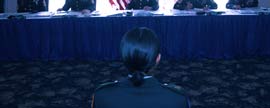The leadership of Noncommissioned Officers (NCO) evolved immensely since the birth of the Continental Army in 1775. Commanders charge subordinates with carrying out orders with minimal oversight. The empowerment of subordinates without micromanagement is only possible when trust is amid the leader-subordinate leader relationship. General George Washington did not have a high level of confidence in his NCOs to carry out orders in garrison or battle. This situation caused a catalyst for change and the first evolutionary leadership leaps in history: the standardization of NCO’s daily duties and responsibilities. According to Arms (2007, p. 1), “Inspector General Friedrich von Steuben standardized NCO duties and responsibilities in his Regulations for the Order and Discipline of the Troops of the United States (printed in 1779).” Many of Friedrich von Steuben’s writings are still in use today to include Training Circular 3-21.5, the Army’s Drill, and Ceremonies Manual.
The second leap of professionalizing the NCO corps was the reorganizing, addition, and creation of NCO ranks. These gestures suggest one; there was a need to professionalize the NCO corps. Two, present an opportunity to keep senior NCOs in the formations as their knowledge and expertise became value-added. The reorganization of ranks originated after World War I. “Five NCO ranks were established: master sergeant, technical sergeant, staff sergeant, sergeant, and corporal” (Arms, 2007, p. 32). The addition of two NCO ranks occurred in 1958. The grade of E-8 and E-9 provided a clear and concise delineation of daily duties and scope in the enlisted construct. Eight years later, on July 11, Sergeant Major (E-9) William O. Wooldridge was administered the oath of office as the first Sergeant Major of the Army (SMA), the subject matter expert on all enlisted forces matters. Located in Washington DC, this prestigious position not only became a principal advisor to the Chief of Staff of the Army, but a mouthpiece for all Army enlisted members.
“The very existence of the Office of the Sergeant Major of the Army supports and validates the position of the Noncommissioned Officer Corps as professional—worthy of special respect for commitment, expertise, dedication, and sacrifice in service to the nation” (Mages, Kelly, Elder, Hawkins, & Pierce, 2013, p. 4).
I would argue that the final leap in NCO leadership was the establishment of the Noncommissioned Officer Education System (NCOES) in 1969. Four lines of effort derived from the creation of the NCOES. They were; improvement of the quality of life for NCOs, progressive and ongoing development, improve career appeal and keep the Army units fill with tactically and technically proficient NCOs destined for increased responsibility (Arms, 2007, p. 41). The system provided opportunities for NCOs from E-5 to E-9 opportunities for professional development in a conducive small group environment. Changes occurred over the last fifty years to the NCOES, but all have been for the better to improve the quality of professional education for all Army NCOs.
References
Arms, L. R. (2007). A History of the NCO.
Mages, R. M., Kelly, M. B., Elder, D. K., Hawkins, G. R., & Pierce, P. e. (2013). The Sergeants Major of the Army. Retrieved from https://history.army.mil/html/books/070/70-63-1/CMH_Pub_70-63-1.pdf













